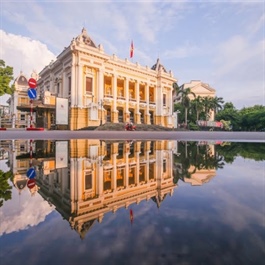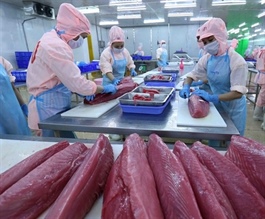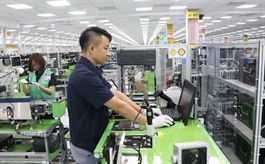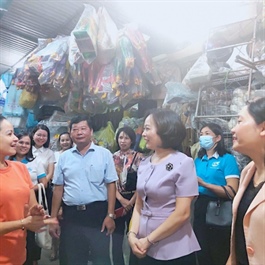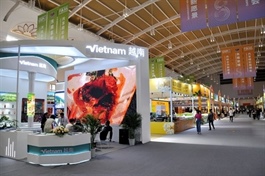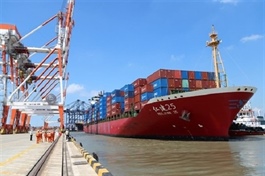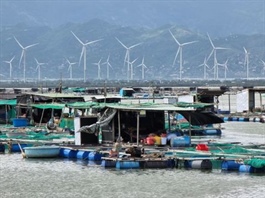Hà Nội promotes farm produce exports
Hà Nội promotes farm produce exports
More than a decade ago, Trần Văn Hiếu and his colleagues established Developing Agriculture and Consulting Environment Company Limited (DACE) headquartered in Bắc Từ Liêm District with a focus on developing growing areas to produce organic spice products from ginger, turmeric, cinnamon, anise, garlic, chilli and lemongrass.
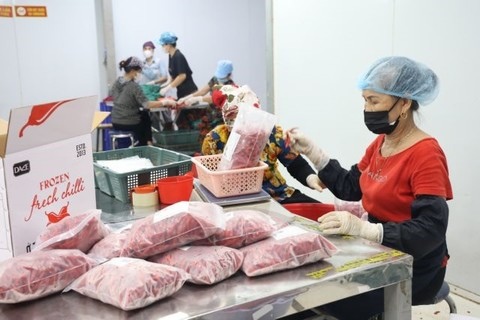
Organic spice products of Developing Agriculture and Consulting Environment Company Limited (DACE). — File Photo |
Since the beginning, DACE has pursued quality certifications with an eye on exports.
Currently, products of DACE have been exported to the US, some European countries, the Middle East, the Republic of Korea, Japan, Australia and Russia. The company's total annual export output reaches thousands of tonnes, mainly for cinnamon, anise, ginger, turmeric and chilli pepper.
Văn Đức Agricultural Service Cooperative in Gia Lâm District owns one of the largest vegetables growing area in the capital city with a total area of 220 hectares. Besides supplying vegetables for supermarkets and wholesale markets, the cooperative also exports around 300-500 tonnes of vegetables mostly to Taiwan (China) and the Republic of Korea.
Many other major high-quality farm products from Hà Nội are also exported to countries around the world such as Đại Thành late ripe longan to the US, Đồng Phú organic rice to Germany, pink aromatic bananas to China, and tea to India, Kenya and Sri Lanka.
Statistics of the municipal Department of Agriculture, show around 250 enterprises and cooperatives in the capital city are exporting agricultural products. Sixty nine enterprises are exporting to East Asia, 59 to the Europe and the US, 50 to South Asia, 19 to Southeast Asia and 13 to the Middle East.
In 2023, exports of farm produce brought in more than US$1.35 billion. In the first half of this year, agricultural products continued to register the highest growth rate among 11 major export products of Hà Nội. Major export farm produces are rice (accounting for 50 per cent of the export value), coffee (14 per cent), cashews (11.5 per cent), pepper (6.8 per cent) and tea (4.6 per cent).
The markets which agricultural products of Hà Nội are exported to all require high quality standards in terms of food hygiene and safety. According to Nguyễn Thị Thu Hằng, Director of the municipal Department of Quality, Processing and Market Development, this affirms their quality.
Hằng said that there is huge potential for Hà Nội to promote the exports of agricultural products. Currently, there are 16 growing areas and four packaging facilities with a capacity of around 30-50 tonnes per day who have been granted codes for exports.
Hà Nội also has large areas of potential products for exports such as Japonica rice (more than 7,000 ha), pink aromatic bananas (3,200 ha), organic vegetables (50 ha) and many processed products of high quality, suitable for domestic and foreign consumers.
Specifically, Hà Nội also pioneers in the development of the One-Commune-One-Product (OCOP) programme, all products highly suitable for export. Since 2019, Hà Nội has evaluated and classified 2,711 OCOP products, including six 5-star, 12 potential 5-star, 1,437 4-star and 1,220 3-star.

Chilli packed for export at DACE. — File Photo |
To support businesses in promoting exports, in municipal agriculture the department has regularly organised activities to provide training and disseminate regulations of major export markets and free trade agreements such as the EU-Việt Nam Free Trade Agreement (EVFTA) and the Comprehensive and Progressive Agreement for Trans-Pacific Partnership (CPTPP) for enterprises, producers, traders and exporters.
According to Bùi Thị Hạnh Hiếu, general director of Bảo Minh Agricultural Products Processing and Business Joint Stock Company, quality is the first thing exporting farms need to focus on.
To ensure quality, her company has joined with farmers in the capital city to establish a closed value chain to ensure product quality and traceability.
There are a number of factors which affect the export capacity of Hà Nội, among which, the most important factor is to standardise products, Tạ Văn Trường, Deputy Director of Hà Nội Department of Agriculture and Rural Development said.
When the quality and safety of products are ensured, the opportunity to meet technical requirements will be greater, thereby increasing the opportunities to access export markets.
He added that Hà Nội needs large enterprises with capacity to invest in high-tech agriculture and processing.
In addition, the capital city needs to regularly organise trade promotion programmes and improve regional links to increase exports, along with providing trainings and consultancies for enterprises in building brands, developing products and production and business strategies.
Nguyễn Mạnh Quyền, Deputy Chairman of Hà Nội People’s Committee, said Hà Nội’s agriculture must rise to be the spotlight of the country in term of technology and processing.
Hà Nội must become a centre for transshipments and processing of agricultural products and the agricultural industry of the capital city must link with other provinces and cities in accordance with international standards to serve domestic consumption and boost exports.








